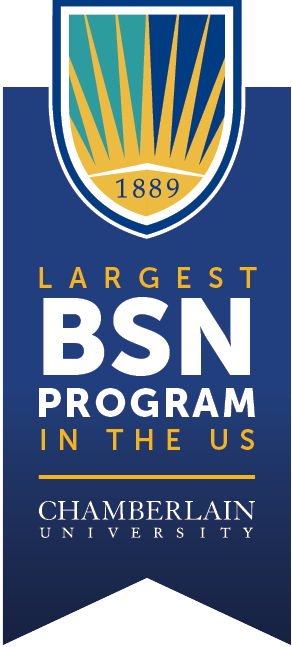

Enter directly into the BSN nursing program with no pre-nursing course requirements.
20+ Campuses or OnlineEnter directly into our BSN nursing program, with no waitlist* at most of our 20+ campus locations or through our BSN Online Option.
Grants and ScholarshipsFinancial aid in the form of federal and private loans, scholarships, grants and work-study is available to those who qualify.
Experience and ExpertiseJoin the nation’s largest school of nursing that has been teaching for over 130 years and has over over 160k students, faculty and alumni around the world.
An inclusive nursing BSN community
By attending the largest pre-licensure Bachelor of Science in Nursing program in the country, you’ll join a network of nurses who step forward to support each other – and their patients. Earn a BSN degree you can be proud of. Contact our admissions team to learn more.
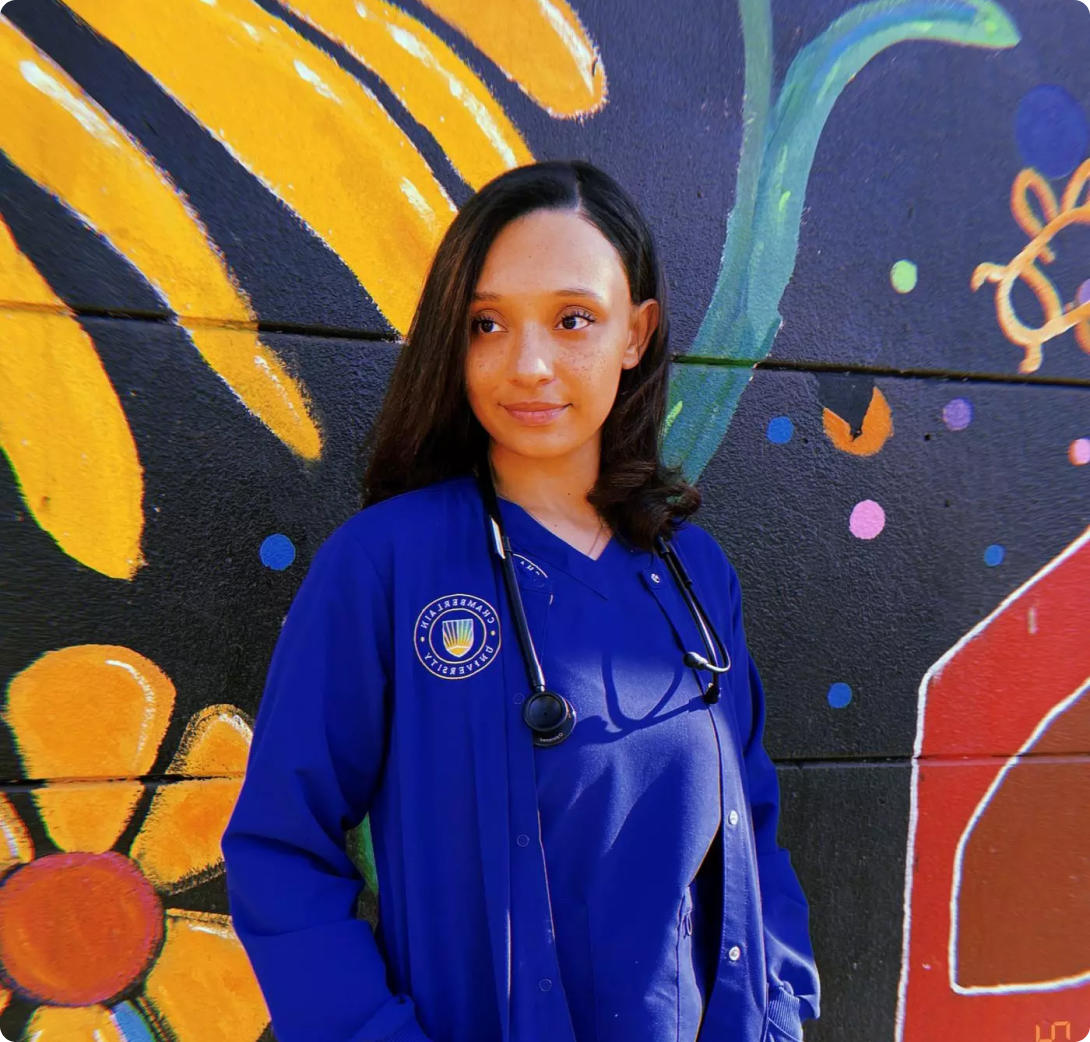
“I interviewed for three jobs, and I was offered three positions. Each interviewer told me specifically that they have had really good experiences with Chamberlain-prepared graduates. It's important to know that your degree is respected in your community.”
‘21 BSN student, Columbus Campus
Small Class SizesLearn from instructors invested in your success, and who provide individualized support.
SIMCARE Center & Nursing Skills LabsPractice nursing skills and receive feedback in a safe, simulated environment before you treat a patient.
Clinical ExperienceCare for your first patients in diverse health care settings, with an experienced nursing BSN instructor by your side.
Entry-Level BSN ProgramThe direct entry BSN program is designed for you to complete your general education requirements and nursing courses at the same time. This means you can start taking nursing courses as soon as your first semester. See the full BSN curriculum plan.
A hands-on BSN program
Gain the skills and confidence you need to provide the highest quality of care to your patients in Chamberlain’s BSN program.
You’ll start taking nursing classes on Day 1, with a focus on critical thinking and translating theory into practice. Some of your classes will be online. After you hone your nursing practice and caregiving skills in our labs, you’ll be ready for clinicals.
Offers the optimal blend of flexibility, interactivity and experiential learning.
Visit the BSN Online page to learn more.
Presents the best of both worlds by offering traditional and online learning experiences.
* Exceptions may occur in the hybrid standardized course delivery model by a specific campus location.
Provides the option to attend in person classes during the evenings and weekends.
* Evening and weekend option is available in select markets. Visit the locations page to see if available where you live.
![]()
Request information to connect with an admissions representative.
As a Chamberlain College of Nursing BSN student, you may have opportunities to experience practice settings that include large and small hospitals, long-term care facilities, community and public-health agencies, faith-based service organizations, independent practices, ambulatory care centers, public health agencies, military services (Army, Navy, and Air Force), Veteran’s Administration Medical Centers, schools, home health environments… anywhere healthcare is delivered.
When do I participate in clinicals if I attend at campus location?All BSN nursing students begin their hands-on learning in the SIMCARE CENTER™, located on each campus. There, you’ll care for simulated patients dealing with various medical scenarios, including giving birth. You receive feedback from instructors, and grow comfortable with your nursing skills in a safe environment. Once fundamental skills have been mastered and validated, students begin clinicals.
Generally, clinicals last for the duration of the clinical course. Clinical shifts average six to eight hours, one to two days per week. The BS in nursing program has a total of 10 clinical courses.
What are some examples of clinical nursing courses?Clinical BSN nursing classes include NR-328 Pediatric Nursing, NR 326 Mental Health Nursing and NR 442 Community Health Nursing. View a full sample BSN curriculum plan.
When do I participate in clinicals if I attend BSN Online?You will begin prepping for your clinicals through virtually stimulated patient encounters using i-Human Patients and in-home health kits. Before moving into in-person clinical experiences you will attend an in person clinical skills check-off. Clinical Learning Experiences typically occur between weeks 3 through 8 and may require significant travel. Days and times are subject to change based on clinical course hour requirements and availability at a clinical partner site.

Take your comprehension to the next level with workshops, tutoring, NCLEX® prep – and much more

Tap our attentive faculty of Master’s-prepared nurses for extra support
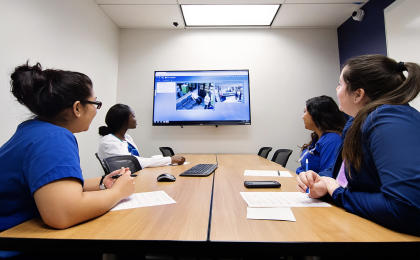
Your first stop for all questions nursing school - or just a listening ear when you need it

Need a little extra support? Perspectives can help you with everything from stress management to financial consultations.
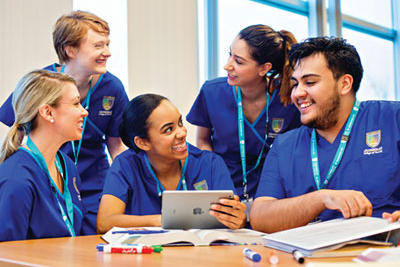
No one understands nursing school like your fellow classmates. Get involved in a student group – or connect in the classroom
You’re never alone at Chamberlain
The road to earning a BSN degree isn’t always smooth – and it’s important to know you have a strong support system to partner with you on your good days and bad.
You can feel confident everyone shares the same goal at Chamberlain - to see you succeed as a nurse. Our 130+ years of educating nurses means have experience in delivering the support systems you needs to to complete your BSN and prepare you to take the NCLEX.
We’re with you every step of the way.
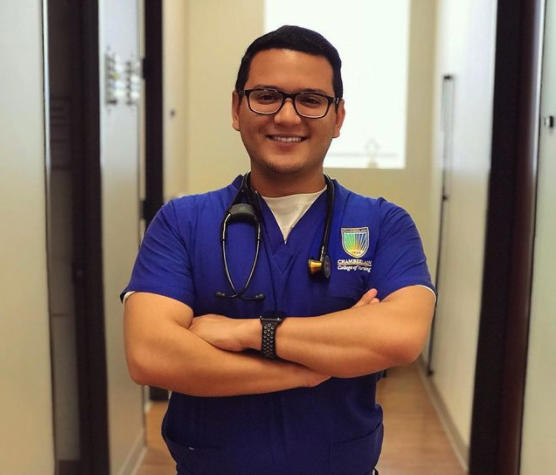
What is campus life like?
“There was always an opportunity to join an organization on campus, and they did a really good job of including everyone and making their presence known. I thought it was great. There was always something going on.”
‘21 BSN student, Houston Campus
Leverage resources dedicated to your academic success
Ask a Chamberlain BSN student their secret to success and you’re likely to hear a common response: they take advantage of all the resources available to support their nursing BSN journey.
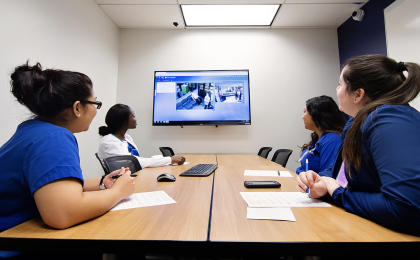
Take advantage of group course content review sessions or one-one-reviews led by content experts. Ask questions of other BSN students, or spend time with an expert going through a recent test to truly understand questions you might have missed.

The NCLEX-RN® Exam is too important to cram for. You’ll start to prepare during your courses, with access to tutorials, assessments, practice tests and comprehensive support and planning tools. All are integrated into your BSN curriculum so you feel confident on exam day.
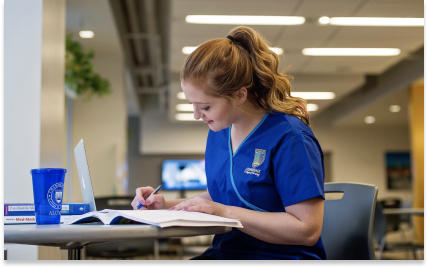
As a nurse, your patient encounters will require you to perform a history, identify and prioritize issues and interventions, and much more. When you care for a virtual i-Human patient, you’ll get experience with these skills in a safe environment as you work towards your bachelor’s degree.
Attend a BSN program that works with your life
Earn your BSN degree at one of 20+ campus locations across the United States.
| AZ - Phoenix | MO - St. Louis |
|---|---|
| CA - Irwindale | NV - Las Vegas |
| CA - Sacramento | NJ - North Brunswick |
| FL - Jacksonville | NC - Charlotte |
| FL - Miramar | OH - Columbus |
| GA - Atlanta | TX - Houston |
| IL - Addison | TX - Irving |
| IL - Chicago | TX - Pearland |
| IL - Tinley Park | TX - San Antonio |
| IN - Indianapolis | VA - Tysons Corner |
| LA - New Orleans | BSN Online Option |
| MI - Troy | Clinical in select states |

Combine 100% online classwork with on-site clinical rotations at our partner locations. Check to see if BSN Online is available in your state.
Evening & Weekend OptionAttend nursing school on nights and weekends, and still earn your bachelor’s degree in as few as three years on our Addison, Atlanta, Chicago, Houston, Irving, North Brunswick, Pearland, Phoenix, Troy and Tyson’s Corner campuses.
Campus HybridCombine the benefits of online and on campus learning. Fewer hours commuting to and attending campus classes means you get time back – for however you want or need to spend it. Available at most Chamberlain campuses.
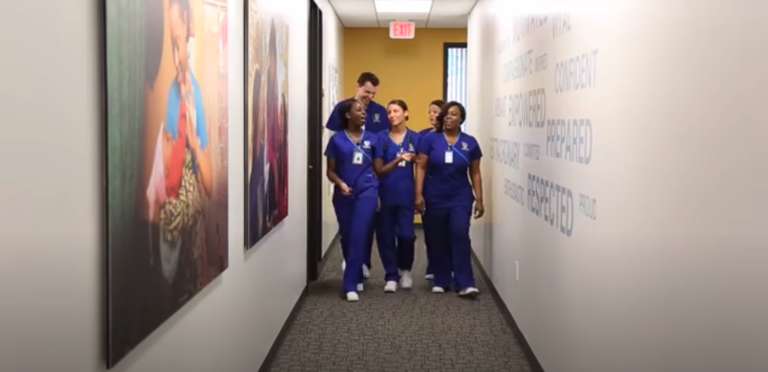
Chamberlain is ready to welcome you to one of our 20+ campus locations. You can feel confident that everyone shares the same goal at Chamberlain - to see you succeed as a nurse. Our 130+ years of educating nurses means we have experience in delivering the support systems you need to complete your BSN and prepare you to take the NCLEX ® .

You’re more than just an application or a test score.
If you fall below our academic eligibility requirements, our admissions committee will still consider whether you can be successful in our BSN program.
How do I get started?
New students can enroll at Chamberlain up to six times per year, with no prerequisite courses required for admission.
To view all requirements, review the Undergraduate Admission section of the catalog
*Not all locations require an application fee. Visit the location page for your campus to learn more.
Your application will be sent to the admission committee. If accepted into Chamberlain, you will need to initiate drug, background and fingerprint screenings and either clear all screenings within 120 days of the session start date or sign a self-attestation and disclosure indicating their ability to clear all screenings within 120 days of the session start date before the applicant is granted acceptance.
Your BSN degree is closer than you think
Whether you have a bachelor’s degree in another field, or have just taken a few classes at the college level, you may be able to earn your BSN degree even faster as a transfer student than the typical three years of year-round study.
Bachelor’s Degree in Another Field*Thinking of switching to a more meaningful career where you can serve others, or a fresh start in a fresh-growing field? Chamberlain is here to help you achieve it as quickly as possible - request more information to learn more. You’ll have access to:
*Applicants for the Tyson’s Corner campus must provide a high school/equivalency transcript documenting proof of graduation.
Transfer StudentsWe welcome transfer students, and encourage you to plan ahead. Here’s how to get started:
Combine either the Future of Nursing Grant or the Catalyst Grant with most other grants and boost your savings towards your BSN.
Your Nursing School Investment
Earning your BSN degree is a significant investment, and one of the most important ones you will make. View more information about tuition & expenses for our BSN program. Get support as you navigate paying for your nursing education.
If you fall below our academic eligibility requirements, our admissions committee will still consider whether you can be successful in our BSN program.
Explore a wide range of financial aid available to Chamberlain BSN program students. View all financial aid options.
Excellence in Education Grant$500 per session (up to $5,000) for BSN students with exceptional academic scores (min. 2.85 GPA on a 4.0 scale & an average HESI A2 custom score of 75 or greater)
High School to BSN Grant40% Off Tuition, up to a $34,000 value in tuition savings for new students who graduated high school or earned their GED within the past 2 years and have less than 10 college credits at our campus.
Certified Caregivers Grant$600 per session (up to $6,000) for BSN students who hold a certification in one of the following: LPN, CNA, CMA, EMT, CST, PCT, CMT and LVN.
Explore frequently asked questions
Does Chamberlain have an LPN to BSN or LVN to BSN program?Qualifying students with an LPN or LVN license have the opportunity to earn their BSN with up to 9 proficiency credits, following skills validation tests and proficiency exams. Call 877.751.5783 or request more information on this path.
Does Chamberlain accept transfer credits?Chamberlain welcomes transfer students from other institutions. A credit evaluation will tell you exactly how many courses will transfer into the BSN program. Contact admissions to get started.
How much is the BSN program at Chamberlain? Is Chamberlain University accredited?Chamberlain is accredited by the Higher Learning Commission (HLC), with multiple program accreditations from the Commission on Collegiate Nursing Education (CCNE).†
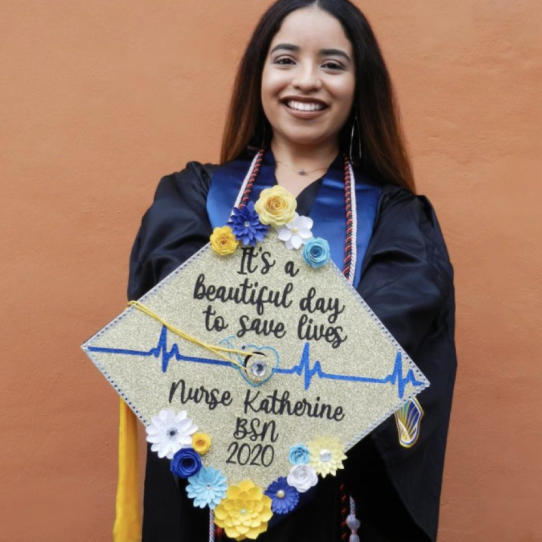
Answer the call to step forward
If you’re here, exploring a bachelor’s degree in nursing, then you’ve felt it - the calling to help people at their most vulnerable and to step forward to care for patients and families. Here are a few more reasons we feel it’s a rewarding path:
Take the first step towards a fulfilling nursing career - contact admissions today.
Still have questions? Our admissions team is here to help.
What is a BSN degree?A BSN degree is a Bachelor of Science in Nursing. The BSN is increasingly becoming the preferred nursing degree program, due to employer preference, higher NCLEX-RN® pass rates and improved patient outcomes.
What is the difference between RN and BSN?A Bachelor of Science in Nursing (BSN) is the degree you earn. A registered nurse (RN) is a job title or the licensure you are granted through your state to practice. Read more here.
What is the difference between ADN and BSN?ADN stands for an associate’s degree in nursing, and a BSN is a bachelor’s degree in nursing. Both programs are pre-licensure programs that are pathways to become a registered nurse. While an ADN will get you into the workforce quicker, more forces are starting to favor the BSN degree. Find out more here: ADN vs. BSN: Explore the Difference.
How long is nursing school?This will depend on what educational path you take. An associate’s degree typically takes two years, while a bachelor’s degree in nursing program will usually take 3-4 years.
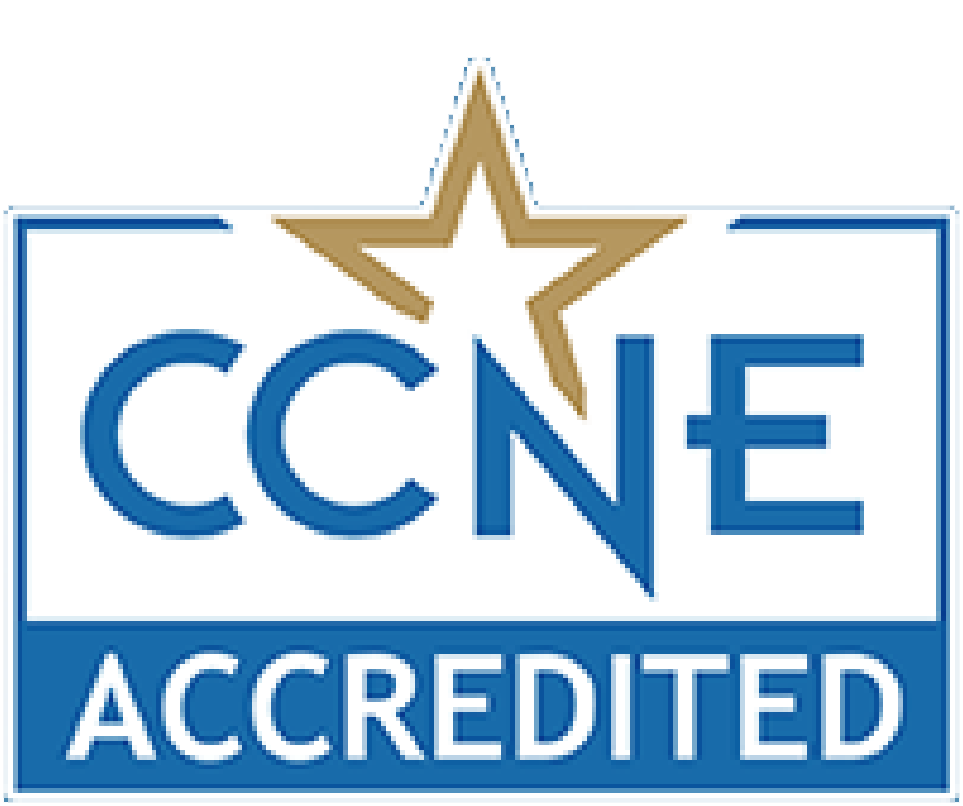


Earn a BSN degree from a proudly accredited institution
In addition to a university accreditation from the Higher Learning Commission (HLC) and multiple program accreditations from the Commission on Collegiate Nursing Education (CCNE).† Chamberlain continuously earns new approvals from respected agencies across the nation.
Students are introduced to the fundamental skills of professional nursing. An introductory unit of physics provides the basis for understanding concepts such as body mechanics, positioning and mobility. The laboratory component provides practice of selected fundamental nursing skills, as well as psychomotor skills necessary for care of individuals requiring assistance with mobility, hygiene and comfort. Included are basic principles of drug administration, teaching-learning and vital-sign assessment. Students have the opportunity to develop the beginning skills of a professional nurse through experiential learning.
NR-228: Nutrition, Health & WellnessThis course provides an overview of the basic nutrients required by the body for optimal health and wellness. The role that nutrition plays in various phases of the human life cycle and the psychological and sociological implications of food are discussed. Students use scientific thinking to question nutritional information presented in the various media and dispel any common nutrition myths. Students learn how the scientific method of inquiry is used in nutritional science and the health fields. In addition, the application of nutritional concepts to care for patients are studied. Lastly, conditions that are amenable to modification and possible cure by diet therapy and other nursing and medical interventions are explored.
NR-283: PathophysiologySelect pathophysiologic processes of disease, clinical manifestations, complications and variations in wellness will be explored. Environmental and lifestyle influences are examined as well as other risks and influences on pathophysiological processes.
NR-293: Pharmacology for Nursing PracticeThis course introduces a comprehensive approach to the clinical aspects of drug therapy, which are emphasized through the use of the nursing process, life span implications and basic principles of pharmacology. The course content includes several classifications of commonly prescribed medications, as well as selected complementary and alternative drugs. Within each classification, representative or prototype drugs are selected for study in terms of their mechanisms of action and therapeutic uses. Students apply knowledge of pharmacological concepts in the context of safe and effective nursing practice, which include methods of administration, safe dosage, side and adverse effects of medications, nursing implications and medication teaching.
NR-324: Adult Health IThe focus of this course is on the needs of adult patients and their families in relation to health promotion and management of conditions that require acute and chronic care. The nursing process is used in the discussion of health alterations affecting selected life processes. Students continue their professional skill development as members of the health team. A variety of populations and settings are used in the experiential learning component of this course.
NR-325: Adult Health IIThis course focuses on alterations in life processes, including the effect on the patient’s family. The nursing process is used to make clinical decisions and foster health restoration and maintenance. Emphasis on discharge planning is included. A variety of populations and settings are used in the experiential learning component of this course.
NR-326: Mental Health NursingEmphasis is on the dynamics of an individual’s ability to function in society. The course focuses on content relative to anxiety, self concept, thought disorders, mood alterations, addictive behaviors, organic brain dysfunction, abuse and violence issues. It also incorporates health promotion and wellness issues such as stress management and personal growth. Therapeutic communication techniques, individual and group therapy practices and community mental-health resources are also incorporated. A variety of population and settings are used in the experiential learning component of this course.
NR-327: Maternal-Child NursingThis course focuses on family-centered approaches to maternal/newborn care and incorporates health promotion and wellness issues. The childbearing cycle, including normal experience, high-risk factors, complications and alterations are studied. Additional women’s health issues are included. A variety of populations and settings are used in the experiential learning component of this course.
NR-328: Pediatric NursingFamily-Centered care of children is the focus of this course, exploring issues of normal child care as well as health alterations of children from infancy through adolescence. Students participate as members of the multidisciplinary health team to provide health promotion, illness prevention, health restoration and maintenance and rehabilitative care to children and families. A variety of population and settings are used in the experiential learning component of this course.
Explore our related programs.
Main Campus
Addison Campus
1221 North Swift Road
Addison, IL 60101
National Management Offices
500 W. Monroe St, Suite 1300
Chicago, IL 60661
2024 Chamberlain University LLC. All rights reserved.
† Chamberlain University is accredited by the Higher Learning Commission (www.hlcommission.org), an institutional accreditation agency recognized by the U.S. Department of Education. The baccalaureate degree program in nursing, master’s degree program in nursing, Doctor of Nursing Practice program and post-graduate APRN certificate program at Chamberlain University are accredited by the Commission on Collegiate Nursing Education, ccneaccreditation.org. The Chamberlain University Doctor of Nursing Practice (delivered via distance education) is accredited by the National League for Nursing Commission for Nursing Education Accreditation (NLN CNEA) located at 2600 Virginia Avenue, NW, Washington, DC 20037 (202-909-2526). Chamberlain University’s Master of Public Health Program is accredited by the Council on Education for Public Health, www.ceph.org. For the most updated accreditation information, visit chamberlain.edu/accreditation. Chamberlain University’s Master of Social Work degree program is accredited by the Council on Social Work Education’s Commission on Accreditation, www.cswe.org. The Accreditation Review Commission on Education for the Physician Assistant, Inc. has granted Accreditation-Provisional status to the Chamberlain University Physician Assistant Program.
Certified to Operate by SCHEV.
To report unresolved complaints to the Illinois Board of Higher Education visit their webpage at https://complaints.ibhe.org/ or by mail to 1 N. Old State Capitol Plaza, Suite 333, Springfield, IL 62701-1377. View Chamberlain's complaint process.
Chamberlain University confers online degrees from its Main Campus in Addison, IL.